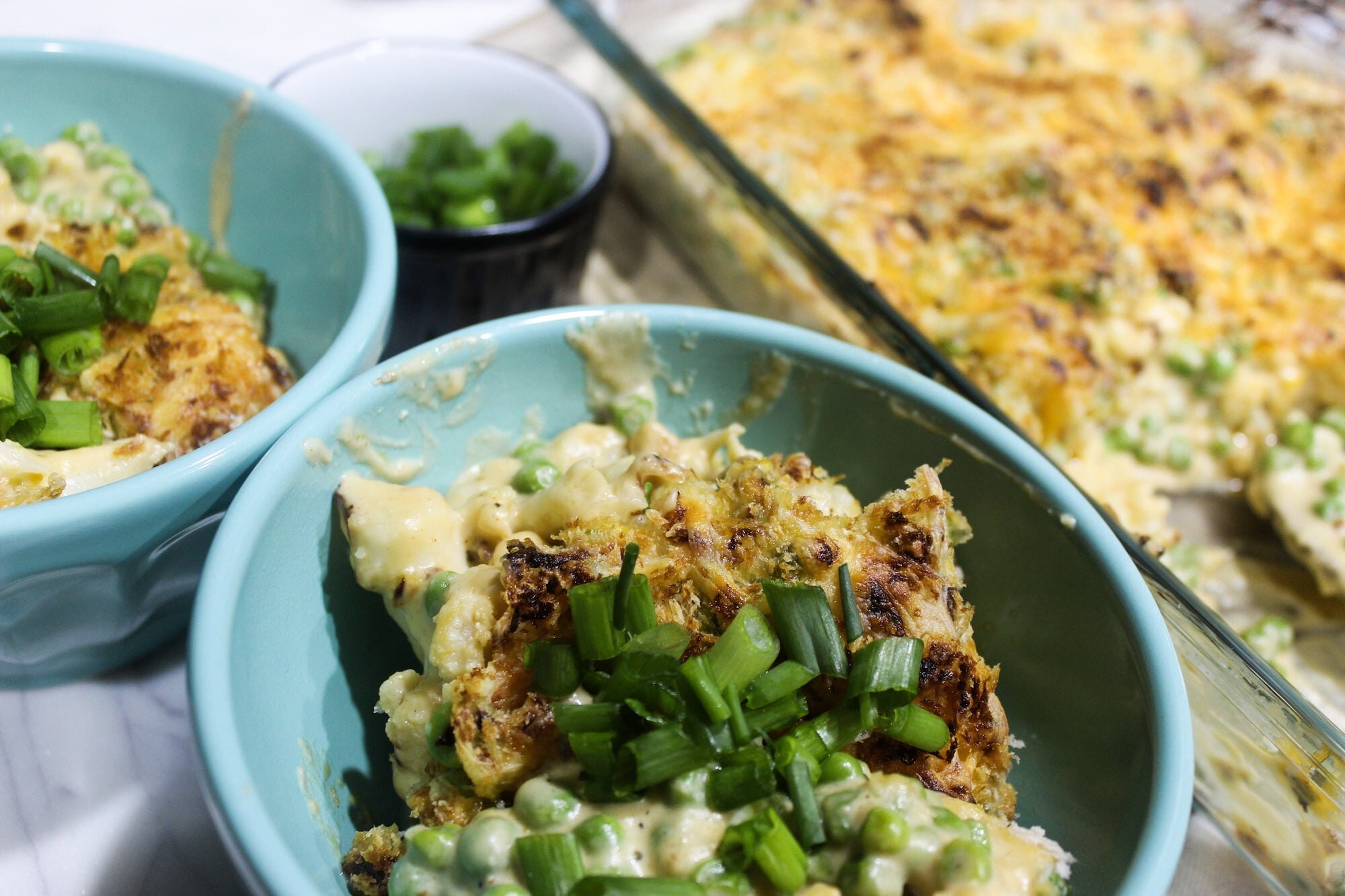Cauliflower Fettuccine Alfredo with Asparagus & Peas
Cauliflower alfredo sauce is something I’ve wanted to try making for awhile — but, it’s like, cauliflower alfredo? There’s no way it tastes like the real thing.
And after actually making the sauce, I’ll honestly say that no, it does not taste exactly like alfredo sauce. However, it’s delicious in its own right — garlicky, creamy and satisfying nonetheless.
It’s pretty simple, too — lots of roasted garlic plus cauliflower, of course, and milk, sal,t pepper and a bit of cornstarch. Simple. Toss the sauce with fettuccine, top the pasta with peas and asparagus, and I guarantee you’ll be surprised by the tasty results.
INGREDIENTS
14 oz. fettuccine (we used a gluten-free rice version)
1 head of cauliflower, cut into florets
1 bundle of asparagus
13 oz. frozen peas
10 cloves whole garlic, peeled
6 c. vegetable broth
2 T. butter
1/2 c. milk, plus more to taste (or use your favorite non-dairy milk)
1/2 c. Parmesan cheese, plus more to top (or use your favorite vegan Parmesan)
3 T. cornstarch
Salt & pepper, to taste
Olive oil
STEPS
1) Add just a splash of olive oil to a small pan over high heat and place the garlic cloves in the pan. As they heat, you’ll start to hear the cloves pop like popcorn. Shake them around a bit, allowing them to brown slightly without burning. Once browned, remove from heat.
2) Add the vegetable broth to a large pot and bring to a boil. Add the cauliflower florets to the pot and cook until the cauliflower just starts to soften. Place a colander over a large bowl and drain the cauliflower so that the broth is reserved in the large bowl.
3) Melt the butter in the pot you used to boil the cauliflower. Once the butter is melted, place the cauliflower back into the pot and allow it to brown slightly, stirring often. Remove from heat.
4) Place the cauliflower and the garlic cloves into a large food processor along with the milk and Parmesan cheese. Season with a bit of salt and a lot of fresh cracked black pepper. Purée until the mixture just becomes smooth. At this point, you’ll know if you need to add more milk to thin out the sauce; you can also add a bit of the reserved vegetable broth. Purée again, allowing the food processor to run until the sauce is super smooth with no hint of graininess.
5) Remember that pot we used earlier to cook the cauliflower? Bring it back out and pour the reserved vegetable broth into it. We’re using this to cook the pasta, so add some water if needed. Bring to a boil and cook the pasta according to package directions. Drain the pasta and drizzle with a bit of olive oil so the pasta doesn’t become sticky.
6) Preheat the oven to 425 degrees. Rinse the asparagus under hot water and cut off the woody bit of each stalk. Place the asparagus on a baking sheet and drizzle with olive oil. Toss to coat, then season well with salt and pepper. Cook for 12-15 minutes or until the asparagus becomes tender (I like asparagus with a bit of a bite to it).
7) Cook the peas according to package directions and set aside.
8) Pour the cauliflower sauce into that same large pot we’ve been using. Turn the heat to medium. Add the cornstarch and whisk well, continuing to whisk until the sauce has thickened and become hot. Remove from heat.
9) Now you have two options. If you want your pasta pretty saucy, then pour the cooked pasta directly into the pot of sauce and stir to combine. If you want less sauce, I would plate the pasta and then drizzle it with sauce. Finally, finish by topping the dish with peas, asparagus, salt and pepper and additional Parmesan, if desired.














